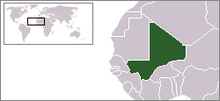LGBT rights in Mali
|
LGBT rights in Mali |
|
|---|---|

|
|
| Same-sex sexual activity legal? | Legal |
| Gender identity/expression | Unknown |
| Military service | Unknown |
| Discrimination protections | No |
| Family rights | |
| Recognition of relationships |
No |
| Adoption | No |
Lesbian, gay, bisexual, and transgender (LGBT) persons in Mali may face legal challenges not experienced by non-LGBT residents. According to the 2007 Pew Global Attitudes Project, 98 percent of Malian adults believe that homosexuality is a way of life that society should not accept, which was the highest rate of non-acceptance in the 45 countries surveyed.
Private, adult, consensual and non-commercial homosexuality is legal in Mali.
Article 179 of the penal code punishes acts of "public indecency" with fines and imprisonment. This has sometimes been used against LGBT people who engage in public displays of affection.
While technically legal, the prevailing cultural and religious beliefs of most Mali citizens view same-sex sexual activity and non-traditional gender roles as immoral.
There are no anti-discrimination laws to protect the LGBT community from harassment and abuse. Although there is no official discrimination on the basis of sexual orientation at the national level, societal discrimination is widespread.
Article 522 of the Portant Code des Personnes et de law Famille, which was passed by the National Assembly on 2 December 2011 and subsequently signed into the law by the president of Mali, forbids homosexuals from adopting children.
According to Dr. Dembelé Bintou Keita, the director of ARCAD/SIDA, an HIV/AIDS organization in Mali that provides health care for men who have sex with men (MSM), Malian society is not tolerant to MSM. They "have no rights and certainly no right to claim their sexual orientation. All cultural beliefs towards MSM are negative." MSM are forced into bisexuality or underground sexual practices that put them at high risk of sexually transmitted and HIV infections. "Men who are attracted to other men are forced to get married so that they will not bring shame to the family ... but they still have men as sexual partners."
The U.S. Department of State's 2011 human rights report found that,
There were no publicly visible lesbian, gay, bisexual, and transgender (LGBT) organizations in the country. The free association of LGBT organizations was impeded by a law prohibiting association "for an immoral purpose"; in 2005 the then governor of the District of Bamako cited this law to refuse official recognition to a gay rights association.
...
Wikipedia
